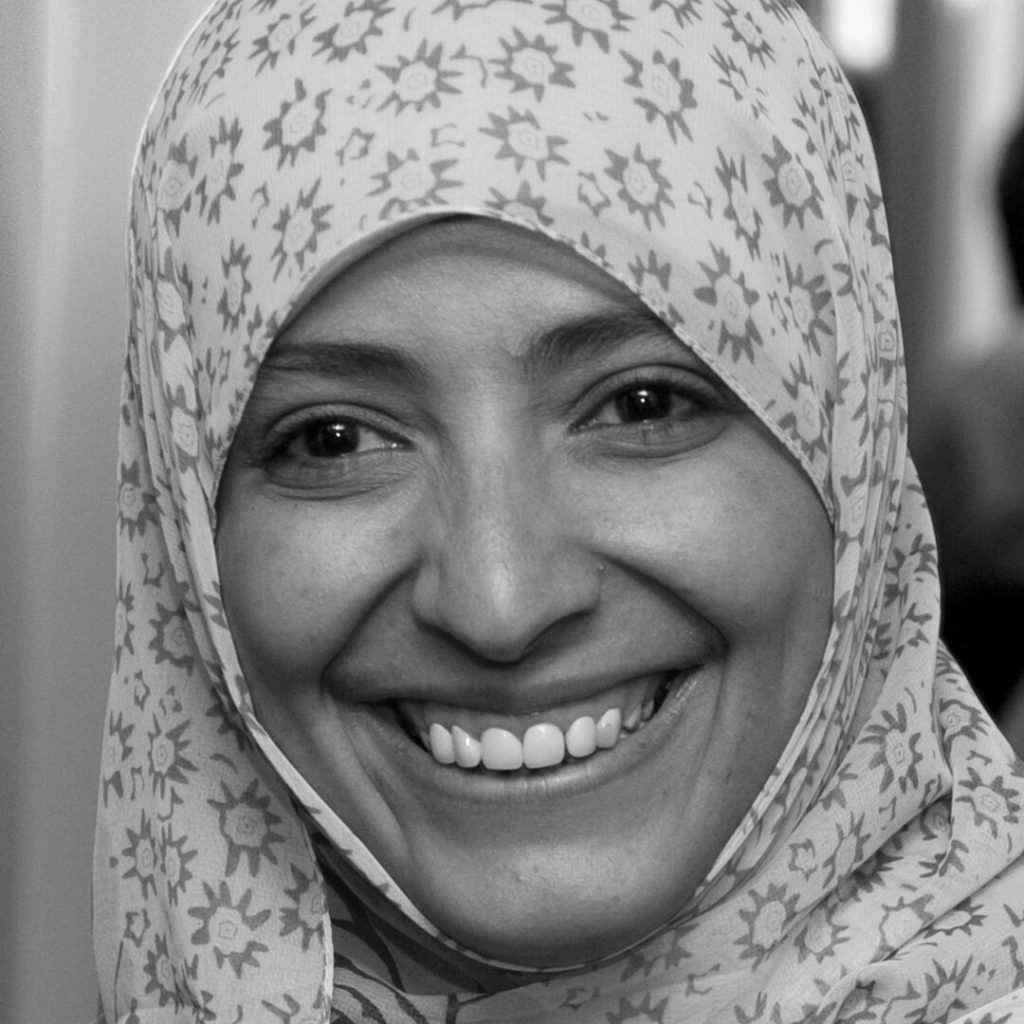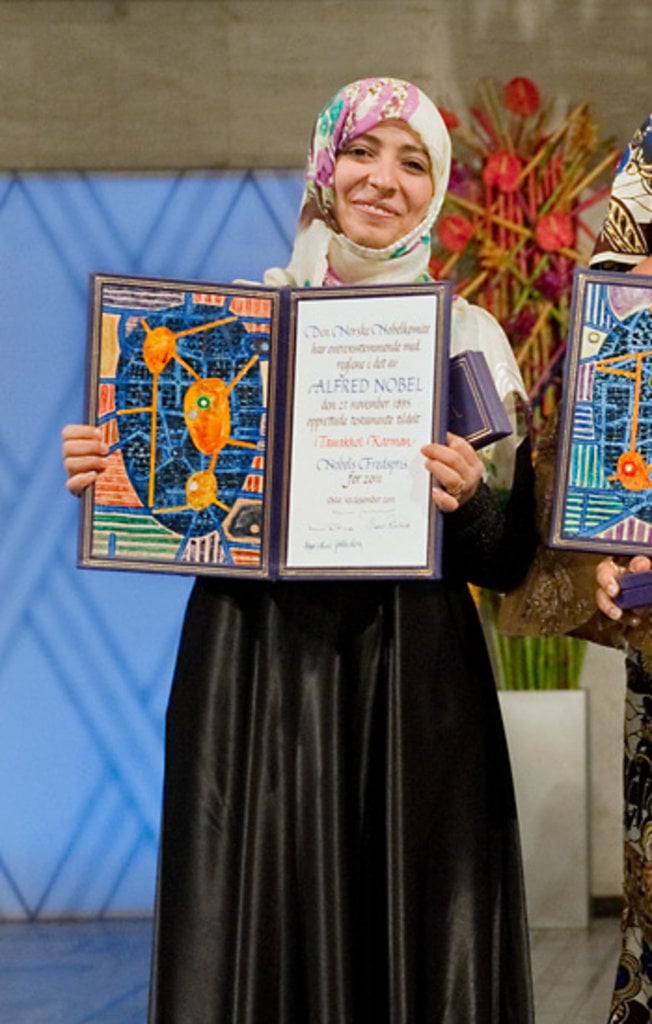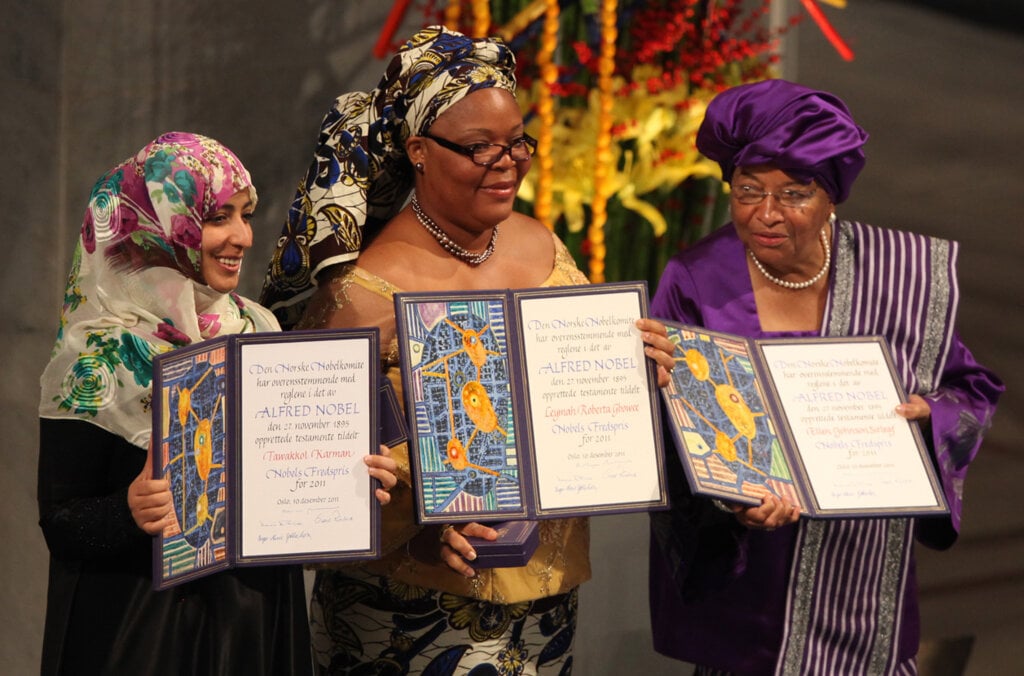Tawakkol Karman
Speed read
Tawakkol Karman was awarded the Nobel Peace Prize, jointly with Ellen Johnson Sirleaf and Leymah Gbowee, for her non-violent struggle for the safety of women and for women’s rights to full participation in peace-building work.

Full name: Tawakkol Karman
Born: 7 February 1979, Ta’izz, Yemen
Date awarded: 7 October 2011
Regime critic and champion of democracy
Tawakkol Karman has played a lead role in the struggle for women’s rights and for democracy and peace in Yemen, both before and during “the Arab Spring “. Since 2005, Karman has been an outspoken critic of Yemen’s President Ali Abdullah Saleh and a regime that prevents people from influencing the country’s political development. Karman founded and led “Women Journalists Without Chains”. In January 2011 she was arrested, but released the next day. Several hundred thousand people protested against Saleh’s regime, which has met the demonstrations in turn with negotiations, concessions and brutal violence. Karman, a mother of three, has received death threats.
"We cannot achieve democracy and lasting peace in the world unless women obtain the same opportunities as men to influence the development of society at all levels of society."
- The Norwegian Nobel Committee, Oslo, 7 October, 2011.
| Democracy Greek for government by the people. A form of government in which all adult citizens participate in the governing of the state and everyone is equal under the law. Most democracies are representative governments. Individuals are elected to assemblies that take decisions on behalf of all citizens. |
"This is a prize for the revolutions in the Arab world. It is for the youth and for peace."
- Tawakkol Karman, Sana’a, 7 October 2011.
The Arab Spring 2011
The Arab Spring began in Tunisia when Mohamed Bouazizi set himself on fire. Widespread frustration at poverty, unemployment and political oppression fanned the protests through the Arab world. Citizens of several countries soon rose against their leaders. Social media such as Facebook and Twitter were key lines of communication. In Yemen, Tawakkol Karman quickly became a leader of the protests against President Saleh’s regime. In response to the awarding of the Nobel Peace Prize, she says that she will continue the struggle for a democratic Yemen “until universal rights are achieved”.
Government and democracy in Yemen
Although democracy in North Yemen was introduced on paper following the 1962 revolt against the imam rule, the country is in practice governed by an elite made up of tribal leaders and military officers and businessmen. Yemen is riven by conflict, and the regime has played various groups off against each other. At the same time, it derives much of its legitimacy from presenting itself as the only possible stable alternative. A lack of state-provided infrastructure and social services means the extended family and clan remain extremely important in everyday life.

Copyright © The Nobel Foundation 2011. Photo: Ken Opprann
Three share the peace prize
The Nobel Peace Prize 2011 was awarded equally to Ellen Johnson Sirleaf, Leymah Gbowee and Tawakkol Karman. They got the prize for their non-violent struggle for women’s security and the right to full participation in peace-building activities. This is the second time in the Nobel Peace Prize’s history that it is awarded to three individuals. The first time was in 1994, when the prize went to Yasser Arafat, Shimon Peres and Yitzhak Rabin for their efforts to bring peace in the Middle East.

Learn more
Read or watch the Nobel Prize lecture by Tawakkol Karman.
Disclaimer: Every effort has been made by the publisher to credit organisations and individuals with regard to the supply of photographs. Please notify the publishers regarding corrections.
Nobel Prizes and laureates
Six prizes were awarded for achievements that have conferred the greatest benefit to humankind. The 14 laureates' work and discoveries range from quantum tunnelling to promoting democratic rights.
See them all presented here.
